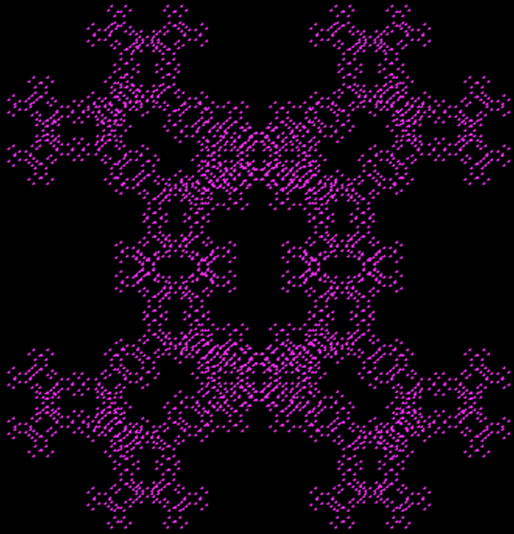CS851:
Biologically-Inspired Computing
Graduate Seminar, Spring 2003
Coordinators:
Jim Cohoon
and
David Evans
Meetings:
Tuesdays and Thursdays,
11-12:15am,
Olsson 228E.
Web Page:
http://www.cs.virginia.edu/bio

|
Announcements
- Reading for Thursday, 3 April: Towards Differential Program Analysis, Workshop on Dynamic
Analysis. 9 May 2003.
- Reading for Tuesday, 8 April:
A Phylogenetic, Ontogenetic, and Epigenetic View of Bio-Inspired Hardware Systems,
Moshe Sipper, Eduardo Sanchez, Daniel Mange, Marco Tomassini, Andres P4erez-Uribe and Andre Stauffer.
Extra reading: Toward Robust Integrated Circuits: The Embryonics Approach,
Daniel Mange, Moshe Sipper, Andri Stauffer and Gianluca Tempesti.
- Tuesday will be on Chapter 5 from:
- 25 Mar: The paper for Thursday is:
- 18 Mar: The paper for Thursday is:
For Tuesday, Ting will present Chapter 1 and Chapter 4
from:
- 4 Mar: Cells inspire spacecraft: NASA seeks inspiration from under microscope, Nature, 27 Feb 2003.
- 1 Mar: Inventors
tiny robots earn big prize
- 13 Feb: Music
of the Swarms, Discover, March 2003.
- 4 Feb: Project Description
- 30 Jan: Scientific
American: Evolving Inventions, John Koza, Martin Keane and Matthew
Streeter (summary only, need to buy it for the whole article)
- 23 Jan: Slides on Genetic Algorithms
- Please submit a Registration Survey
- Class time will be Tuesdays and Thursdays at 11am, as originally scheduled.
- BioWall
Schedule
- 21 Jan: Introduction, Cell-Based Programming (Selvin George)
- 23 Jan: Genetic Algorithms (Jim
Cohoon)
- 28 Jan: Wolfram, Ch 1-3
- 30 Jan: Wolfram, Chapter
3 (Matthew Ziegler)
- 4 Feb: Implications for Everyday
Systems (Wolfram, Ch 8) (Selvin George)
- 6 Feb: Randomness in
Cellular Automata (Wolfram, Ch 10) (Nate Paul)
- 11 Feb: Project Ideas Due
- 11 Feb: Two Dimensions and Beyond (Wolfram, Ch 5) (Hridesh Rajan)
- 13 Feb: Fundamental Physics (or
Wolfram vs. Einstein, Podolsky,
Rosen, Bell, Schrödinger, Bohr, Heisenberg,
Planck, Born, Minkowski, Schwarzschild, Misner, Thorne, Wheeler,
... (Wolfram, Ch 9) (Ben Hocking)
- 18 Feb: Computational Equivalenct (Wolfram, Ch 12) (Ting Yan)
- 20 Feb: Swarm Intelligence: Ant Routing (Rajat Tikoo)
- 25 Feb: Swarm Intelligence: Self Organization (Qing Cao)
- 27 Feb: Project Proposals Due; Short Project Proposal Presentations
- 11 March: Swarm Intelligence: Humans — Actual, Imagined and
Implied (Hridesh Rajan)
- 13 March: Swarm Intelligence: Implications and Speculations (Hongtao Zhang)
- 18 March: Swarm Intelligence: Implications and Speculations, cont. (Hongtao Zhang)
- 20 March: Amorphous Computing: Communications (Jun Wang)
- 25 March: Amorphous Computing: Paintable Computer (Ting Yan)
- 27 March: Biologically-Inspired Neural Nets (Ben Hocking)
- 1 April: Paintable Computer, Chapter 5 (Applications) (Rajat Tikoo)
- 3 April: Differential Program Analysis (Joel Winstead). Paper: Towards Differential Program Analysis, Workshop on Dynamic
Analysis. 9 May 2003.
- 8 April: Embryonics (Matthew Ziegler). Paper:
A Phylogenetic, Ontogenetic, and Epigenetic View of Bio-Inspired Hardware Systems,
Moshe Sipper, Eduardo Sanchez, Daniel Mange, Marco Tomassini, Andres P4erez-Uribe and Andre Stauffer.
Extra reading: Toward Robust Integrated Circuits: The Embryonics Approach,
Daniel Mange, Moshe Sipper, Andri Stauffer and Gianluca Tempesti.
- 10 April: Organizing
a Global Coordinate System from Local Information on an Ad Hoc Sensor
Network (Radhika Nagpal, Howard Shrobe and Jonathan Bachrach)
and A
Scalable Location Service for Geographic Ad Hoc Routing
(Jinyang Li, John Jannotti, Douglas S. J. De Couto, David R. Karger,
Robert Morris) (Qing Cao)
- 15 April: Presentations; Slides
- 17 April: No Class
- 22 April: Project Presentations: Ben Hocking, Jun Wang, Nathanael Paul, Selvin George
- 24 April: Project Presentations: Matt Ziegler, Ting Yan, Rajat Tikoo
- 29 April: Project Presentations: Julian Dymacek,
Hongtao Zhang, Qing Cao
Overview
Biology has developed effective solutions to tough engineering
challenges through millions of years of evolution. Computer
scientists can learn a great deal by observing nature and adopting
biological approaches to problem solving. Biological systems tend to
be decentralized, adaptive and environmentally aware, and as a result
they have survivability, scalability and flexibility properties well
beyond the best human-engineered systems. This seminar will survey
work in computing that has drawn inspiration from biology, with a
focus on security, survivability and optimization.
Topics
- Cellular Automata
- Neural Networks
- Genetic Algorithms
- Morphogenesis
- Computer Immunology
- Amorphous Computing
- Biological Fault Tolerance
- Self-organization, self-reconfiguring robots
- Viruses, Agents
- Swarm intelligence, Stigmergic Systems
The first part of the course will involve reading and discussing
selected chapters from Stephen Wolfram's A New Kind of
Science. Later readings will be selected from books and research
papers based on student interests.
All students are expected to contribute to the seminar regularly and to
present one or two topics in depth.
In addition, students will work individually or in teams on an
open-ended related research project relevant to the course. A project
proposal will be due on February 27. The best projects should turn into
conference papers.
No prior biology knowledge is expected, although students may find it
helpful to read some introductory biology materials.
Reading List
Links
|

